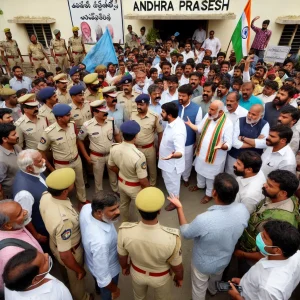
The recent debate over the Waqf (Amendment) Bill in Parliament has triggered sharp reactions from across the political spectrum. As opposition members raised their voices against alleged procedural irregularities, the ruling dispensation maintained that the bill was essential for reform. But beneath the surface, this controversy is not merely about legal amendments; it is a larger reflection of India’s political landscape where religious institutions, governance, and electoral compulsions often intertwine.
AIMIM chief and Lok Sabha MP Asaduddin Owaisi has been particularly vocal, calling the bill an outright betrayal of Muslim interests by parties such as the JD(U), TDP, and LJP(RV). He contends that the amendments undermine the very essence of the Waqf system, allowing for greater government control and diluting community autonomy over religious endowments. His accusations, directed at leaders like Nitish Kumar, Chandrababu Naidu, and Chirag Paswan, indicate a fracture within opposition ranks, with some regional parties siding with the government on this contentious issue.
At the heart of the disagreement is a fundamental question—who controls Waqf properties, and how should disputes be resolved? The bill introduces changes that could allow non-Muslims to be appointed to Waqf Boards, a move that critics argue is against the spirit of minority rights. Furthermore, provisions that enable the government to intervene in Waqf property disputes have sparked fears of increased state interference. Given India’s history of communal tensions over religious sites, any such move naturally invites skepticism and resistance.
Procedural concerns have added fuel to the fire. Opposition members allege that their dissent notes were deliberately removed from the committee’s report, undermining the parliamentary process. If true, this raises serious concerns about transparency and the government’s approach to legislative scrutiny. While the ruling party insists that the amendments are necessary for streamlining governance, how they have been pushed through leaves much to be desired.
The broader political implications cannot be ignored. With elections on the horizon, parties are calibrating their positions carefully. The BJP and its allies see this bill as part of their governance and reform agenda, but also as a move that consolidates their standing among certain voter bases. Meanwhile, opposition parties are walking a tightrope, balancing community sentiments with the need to counter the government’s legislative muscle. The fallout from this debate could shape political alliances in the months to come.
Ultimately, the Waqf (Amendment) Bill is not just about legal technicalities—it is a litmus test for India’s democratic ethos. Can a balance be struck between governance reforms and minority rights? Will political expediency override genuine concerns about representation and autonomy?
As the dust settles on this latest controversy, one thing is clear: the debate over the bill is far from over, and its repercussions will be felt well beyond the walls of Parliament.







